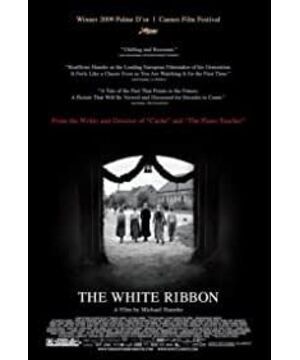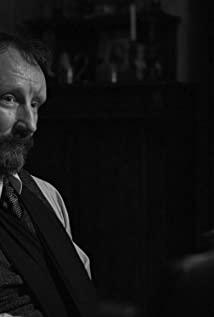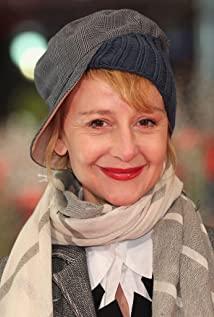——When Maine's evil deeds become a habit unconsciously, and when this habit belongs not only to one person, but to all people, how terrifying the world will become? Black and white films conquer the world Today, I recommend a classic suspense film - "White Ribbon". This is an Austrian German-language film that tells a series of bizarre and murderous stories in a small town on the eve of the First World War from the perspective of a bystander and the language of the camera lens very calmly. Released in 2009, "White Ribbon" was already surrounded by technologies such as colorful and 3D, but it chose black and white film. The seemingly pure and clean black and white picture tells the dark and cold human nature and the future that makes people think deeply. "White Ribbon" starring Christian Friedel, Berghard Kleisner, Ulrich Tucker and others, directed by Michael Haneke. In addition to sweeping the German Film Awards that year, the film also won the Palme d'Or at the 62nd Cannes International Film Festival in France and the 2010 American Golden Globe Award for Best Foreign Language Film. The director of the film, Michael Haneke, is a drama director, which gives him the ability to build a grand framework for the film. Many films such as "White Ribbon" have adopted multi-line and multi-space narratives. Philosophical and psychological background also gave him the ability to explore human nature more deeply. In the early years, the "Glacier Trilogy", "Fluorescent Blood Shadow", "The Heart of the Heart", etc., were all written and directed by Haneke, and his horror and suspense movies that analyzed human nature and reality in a calm way began to be well known. In the new century, Haneke's films "Unknown Code", "Piano Teacher" and "Hidden Camera" gained a lot at various film festivals, which brought him to the peak of his career. And "White Ribbon" is Haneke's most important masterpiece. The story of the crime and purity film "White Ribbon" takes place in a small mountain village in northern Germany between 1913 and 1914, borrowing the eyes of a village teacher to explore a series of strange events. The local doctor was injured when he tripped over a rope on the road while riding home, and the suspect pointed to Clara, Martin and a group of children. The landlord's son was tied up and beaten with a whip. And he was with the children before he disappeared. A series of brutal murders and injuries, such as fire, death, and beatings, seem to be inextricably linked to the lovely children. Is it the crazy revenge of the children, or the humiliation of some people? In the film, the white ribbons are an important image, which must be worn by children under suspicion. White is the color of purity. This is to keep children away from sin, but ironically, it has become a label of sin. it did not end crime as those in power had expected Evil can lead to evil. In those distorted times, no one would consider how much distrust and harsh corporal punishment can do to children physically and mentally. Just as no one would consider the ultimate in purity, the opposite may be sin. The priest, the baron, and others, in the name of justice and under the false disguise, are actually village overlords with a strong desire to control. The town is full of patriarchalism and strict, almost perverted rules. The hand kissing ceremony at the priest's house is one of them. In the era of distortion, the ugliness of human nature is reflected incisively and vividly in these superficial nobles. "I gave God a chance to get to know me, but he didn't, and I think he likes me," Martin said. This sentence of the little boy in the movie is full of longing, longing for love and trust; it is also full of indifference, the indifference after being completely disappointed with everything. Martin's sentence was overheard by the teacher after the female worker was killed. The brutal crime and the shallow monologue are especially meaningful. Language and soundtrack German is the mother tongue of more than 300 million people and is regarded as one of the most rigorous languages in the world. For me, perhaps because of my unfamiliarity, watching films in foreign languages other than English is always a bit uncomfortable. But this film is an exception. The rigor and rigidity of the German language fits surprisingly well with White Ribbon's lifeless, repressed, mysterious atmosphere. The lively and jumping music contrasts sharply with the deep thoughts. Words and voices jump on the human heart little by little. A little bit of warmth as a rural teacher as a story line is also a highlight of the movie "White Ribbon". He's the only bright, warm part of the film's gloomy tone. He is gentle, kind, perceptive, compassionate, caring for his children, and full of love and respect for his fiancée Eva. Fiancée Eva was not shown much, but was equally impressive. This is how teachers describe Eva, "pale face, shy but straightforward personality". But in that place of that era, their pure love will inevitably cast a shadow. Such as the baron's taunts and taunts, the obstruction of Eva's father. And, in the end, it was killed simply and calmly, like the surface of the lake after a stone sinks into the bottom of the lake, and there is no more waves. In the end, after a step-by-step exploration, the disappointment in the village made the teacher choose to leave. However, who is behind the incident, the teacher has doubts, and so does the audience. The open ending of "The White Ribbon" might say this: the murderer is not anyone, and could be anyone. After all, "In an avalanche, No snowflake is innocent. " Whether the movie "White Ribbon" has war and political metaphors is controversial; but what is certain is that the human nature and the dark side of the times excavated in "White Ribbon" are indeed chilling. Every era has its own story, There are also different feelings and sorrows. Cherish what we have, feel the present, and feel the beauty.
View more about The White Ribbon reviews











